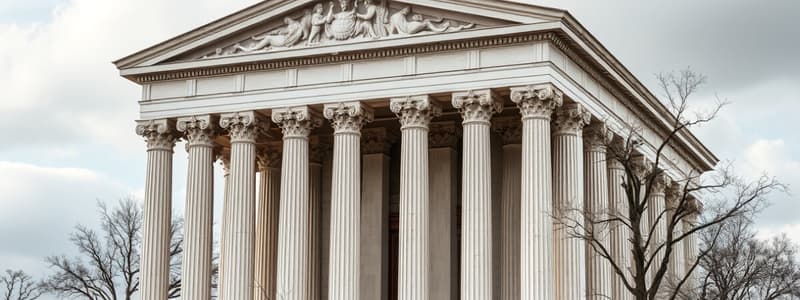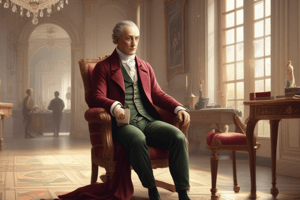Podcast
Questions and Answers
What primarily characterized the Enlightenment period?
What primarily characterized the Enlightenment period?
- Ornate displays of wealth
- Rational thought and advancements in science (correct)
- Baroque artistic styles
- Religious devotion and emotional bias
Who is considered the father of modern philosophy?
Who is considered the father of modern philosophy?
René Descartes
What is skepticism in the context of the Enlightenment?
What is skepticism in the context of the Enlightenment?
A critical attitude based on logic rather than prejudice.
Which of the following best defines rationalism?
Which of the following best defines rationalism?
What defines empiricism?
What defines empiricism?
The Enlightenment led to the rise of the religious philosophy known as ______.
The Enlightenment led to the rise of the religious philosophy known as ______.
Match the following philosophers with their contributions:
Match the following philosophers with their contributions:
Flashcards are hidden until you start studying
Study Notes
Major Themes of the Neoclassical Period and the Enlightenment
- The 17th and 18th centuries marked a shift towards rational thought, science, and philosophical inquiry, known as the Enlightenment.
- Enlightenment thinkers published groundbreaking ideas that shaped modern Western thought.
- Neoclassicism emerged during this period, emphasizing harmony, balance, and classical themes from ancient Greece and Rome, contrasting with the ornate Baroque style.
- Reason and realism were central to both Enlightenment philosophy and Neoclassical artistic expression.
- Moving away from devout faith, Enlightenment philosophers advocated for reason over emotional bias in understanding the world, leading to skepticism, rationalism, and empiricism.
- Enlightenment philosophies prompted questions about political order, influencing Western rulers to adopt rationalist principles in governance.
- Deism arose as a religious philosophy characterized by belief in a non-interfering creator God, common among Enlightenment thinkers.
Skepticism
- Skepticism played a key role in Enlightenment thought, promoting the idea that human understanding should be cautious and not accept hypotheses without evidence.
- René Descartes and David Hume emphasized rational skepticism, which underpinned logical reasoning in their philosophical inquiries.
Rationalism
- Rationalism positioned human reason as crucial for acquiring knowledge, facilitating social improvement and progress.
- René Descartes is recognized as the father of modern rationalism, developing methodologies based on logical deductive reasoning.
Empiricism
- Empiricism focused on gaining knowledge through direct sensory experience and experimentation, foundational to modern scientific inquiry.
- Francis Bacon, regarded as the father of the scientific method, influenced the empirical approach of the Enlightenment.
- Sir Isaac Newton expanded upon Bacon's work, refining the inductive scientific method and contributing significantly to the development of modern science.
Order
- The Enlightenment and Neoclassicism comprised a shift towards a structured worldview, favoring reason and empirical evidence over religious dogma.
Studying That Suits You
Use AI to generate personalized quizzes and flashcards to suit your learning preferences.




